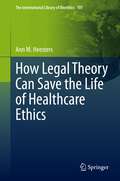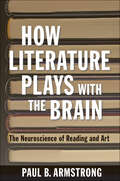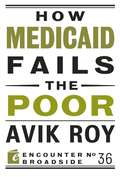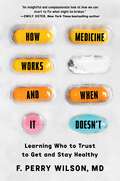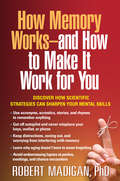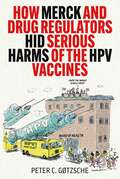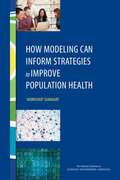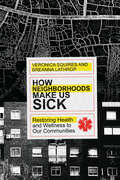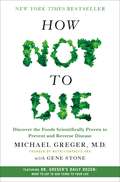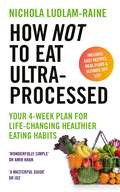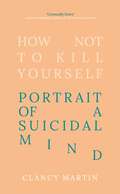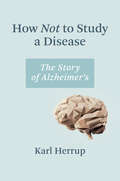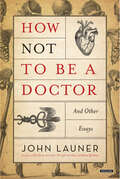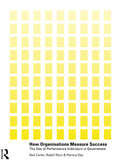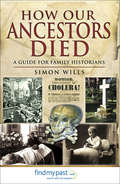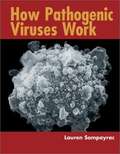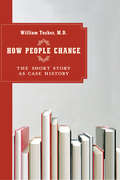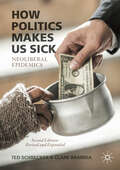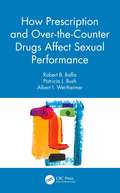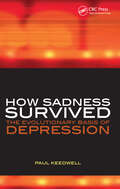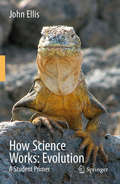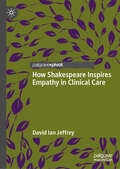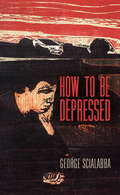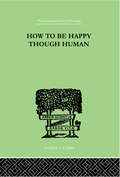- Table View
- List View
How Legal Theory Can Save the Life of Healthcare Ethics (The International Library of Bioethics #101)
by Ann M. HeestersThis book argues that legal theory provides a jumping-off point for the study of controversial topics related to the work of Practicing Healthcare Ethicists (PHEs). Healthcare ethics consultation has had a place in healthcare for many decades yet the nature of the work is not well understood by many of its critics as well as its defenders. PHEs have been described as compromised and ineffectual, politicised and undemocratic, and their promise to offer sound advice has been deemed irredeemably incoherent in the context of value pluralism. Legal theorists have long attended to the relationship between law and morality, and the supposed tension between democracy and the role of an expert judiciary. An appreciation that these debates are not unique to the practice of healthcare ethics can help PHEs to engage critics with a renewed confidence and some fresh approaches to perennial, and hitherto unproductive, arguments. This book will be of great interest to practicing healthcare ethicists, as well as those who rely upon their services (healthcare professionals and healthcare leaders, patients, and their families) as well as academics working in the broader field of bioethics.
How Literature Plays with the Brain: The Neuroscience of Reading and Art
by Paul B. ArmstrongAn original interdisciplinary study positioned at the intersection of literary theory and neuroscience."Literature matters," says Paul B. Armstrong, "for what it reveals about human experience, and the very different perspective of neuroscience on how the brain works is part of that story." In How Literature Plays with the Brain, Armstrong examines the parallels between certain features of literary experience and functions of the brain. His central argument is that literature plays with the brain through experiences of harmony and dissonance which set in motion oppositions that are fundamental to the neurobiology of mental functioning. These oppositions negotiate basic tensions in the operation of the brain between the drive for pattern, synthesis, and constancy and the need for flexibility, adaptability, and openness to change.The challenge, Armstrong argues, is to account for the ability of readers to find incommensurable meanings in the same text, for example, or to take pleasure in art that is harmonious or dissonant, symmetrical or distorted, unified or discontinuous and disruptive.How Literature Plays with the Brain is the first book to use the resources of neuroscience and phenomenology to analyze aesthetic experience. For the neuroscientific community, the study suggests that different areas of research—the neurobiology of vision and reading, the brain-body interactions underlying emotions—may be connected to a variety of aesthetic and literary phenomena. For critics and students of literature, the study engages fundamental questions within the humanities: What is aesthetic experience? What happens when we read a literary work? How does the interpretation of literature relate to other ways of knowing?
How Many Doctors Do We Need?
by Patricia Hodgson Duncan YaggyThis volume addresses the public and private policies affecting physician supply in the United States, focusing on the physician surplus, market forces, and geographic distribution of physicians, life-style choices and evolving practice patterns, market influences of foreign medical graduates, the university's role in establishing priorities for medical education, and other pertinent topics.
How Medicaid Fails the Poor
by Avik RoyMedicaid, America's government-run health insurance program for the poor, should be a lifeline that provides needed health care to Americans with no other options. Surprisingly, however, it doesn't. The medical literature reveals a $450 billion-a-year scandal: that people on Medicaid have far worse health outcomes than those with private insurance, and no better outcomes than those with no insurance at all.Why is this so? In How Medicaid Fails the Poor, Avik Roy explains how Medicaid's clumsy design and perverse incentives make it hard for people on Medicaid to get the medical care they need. Medicaid doesn't reimburse doctors or hospitals for the cost of caring for Medicaid enrollees, forcing many doctors to opt out of the program.The Affordable Care Act, otherwise known as Obamacare, doubles down on this broken system. Roy shows us that there are better ways, using private insurance, to provide needed care to our poorest citizens.
How Medicine Works and When It Doesn't: Learning Who to Trust to Get and Stay Healthy
by F. Perry WilsonBlending personal anecdotes with hard science, an accomplished physician, researcher, and science communicator gives you the tools to avoid medical misinformation and take control of your health: "A brilliant step toward patients and physicians alike reclaiming a sense of confidence in a system that often feels overwhelming and mismanaged" (Gabby Bernstein, #1 New York Times bestselling author of The Universe Has Your Back). We live in an age of medical miracles. Never in the history of humankind has so much talent and energy been harnessed to cure disease. So why does it feel like it&’s getting harder to live our healthiest lives? Why does it seem like &“experts&” can&’t agree on anything, and why do our interactions with medical professionals feel less personal, less honest, and less impactful than ever? Through stories from his own practice and historical case studies, Dr. F. Perry Wilson, a physician and researcher from the Yale School of Medicine, explains how and why the doctor-patient relationship has eroded in recent years and illuminates how profit-driven companies—from big Pharma to healthcare corporations—have corrupted what should have been medicine&’s golden age. By clarifying the realities of the medical field today, Dr. Wilson gives readers the tools they need to make informed decisions, from evaluating the validity of medical information online to helping caregivers advocate for their loved ones, in the doctor&’s office and with the insurance company. Dr. Wilson wants readers to understand medicine and medical science the way he does: as an imperfect and often frustrating field, but still the best option for getting well. To restore trust between patients, doctors, medicine, and science, we need to be honest, we need to know how to spot misinformation, and we need to avoid letting skepticism ferment into cynicism. For it is only by redefining what &“good medicine&” is—science that is well-researched, rational, safe, effective, and delivered with compassion, empathy, and trust—that the doctor-patient relationship can be truly healed.
How Memory Works--and How to Make It Work for You: G1196
by Robert MadiganDo you wish you could recall the names of people you just met? What if birthdays, important errands, and online passwords rarely slipped your mind? Psychologist Robert Madigan is an expert in the "memory arts"--practical, proven methods for improving the ability to retain and use information. Like taking the stairs instead of the elevator, it's important to exercise memory in simple ways every day. That's where this science-based guide can help. Dr. Madigan explains how memory works and presents innovative mnemonic devices and visualization techniques that will help you sharpen your mental skills; avoid embarrassing lapses; and remember faces, appointments, facts, numbers, lists, and much more. Reclaim your brain--this book shows how.
How Merck and Drug Regulators Hid Serious Harms of the HPV Vaccines
by Peter C. GøtzscheThis is a story of scientific misconduct, committed by Merck, the fourth biggest drug company in the world. Merck has committed scientific misconduct before, and the author describes the fraud related to Merck&’s arthritis drug, Vioxx, which killed tens of thousands of patients because Merck concealed that it causes heart attacks. In his role as an expert witness in a lawsuit against Merck, Dr. Peter C. Gøtzsche read 112,452 pages of confidential study reports about Merck&’s HPV vaccine Gardasil, corresponding to five hundred medium-sized books, and wrote an expert report of three hundred fifty pages with four appendices. Dr. Gøtzsche reveals that Merck used numerous tactics to avoid reporting serious neurological harms of Gardasil, including Postural Orthostatic Tachycardia Syndrome (POTS) and Complex Regional Pain Syndrome (CRPS), which, in his view, in some cases constituted outright fraud. How Merck and Drug Regulators Hid Serious Harms of the HPV Vaccines details how the drug agencies were complicit in scientific misconduct and gives many examples that other authorities also provided seriously misleading information about the benefits and harms of the HPV vaccines. Dr. Gøtzsche gives a rare insight into the behavior of drug company lawyers when a company comes under attack for having concealed serious harms of its drug. He describes how he was harassed by Merck&’s lawyer who tried to impugn his character and scientific credibility in ways, which included setting up traps for him during his deposition. If anyone was in doubt whether Merck and our authorities can be trusted, this book gives the answer.
How Modeling Can Inform Strategies to Improve Population Health: Workshop Summary
by Engineering Medicine National Academies of SciencesIn April 2015, the Institute of Medicine convened a workshop to explore the potential uses of simulation and other types of modeling for the purpose of selecting and refining potential strategies, ranging from interventions to investments, to improve the health of communities and the nation's health. Participants worked to identify how modeling could inform population health decision making based on lessons learned from models that have been, or have not been, used successfully, opportunities and barriers to incorporating models into decision making, and data needs and opportunities to leverage existing data and to collect new data for modeling. This report summarizes the presentations and discussions from this workshop.
How Neighborhoods Make Us Sick: Restoring Health and Wellness to Our Communities
by Veronica Squires Breanna LathropOur neighborhoods are literally making us sick. Buildings with mold trigger asthma and other respiratory conditions. Geographic lack of access to food and health care increases childhood mortality. Community violence traumatizes residents. Poverty, unemployment, inadequate housing, food insecurity, racial injustice, and oppression cause physical changes in the body, resulting in disease and death. But there is hope. Loving our neighbor includes creating social environments in which people can be healthy. While working in community redevelopment and treating uninsured families, Veronica Squires and Breanna Lathrop discovered that creating healthier neighborhoods requires a commitment to health equity. Jesus' ministry brought healing through dismantling systems of oppression and overturning social norms that prevented people from living healthy lives. We can do the same in our communities through addressing social determinants that facilitate healing in under-resourced neighborhoods. Everyone deserves the opportunity for good health. The decisions we make and actions we take can promote the health of our neighbors.
How Not to Die: Discover the Foods Scientifically Proven to Prevent and Reverse Disease, First Edition
by Gene Stone Michael GregerIn How Not to Die, Dr. Michael Greger, the internationally-renowned nutrition expert, physician, and founder of NutritionFacts.org, examines the fifteen top causes of premature death in America-heart disease, various cancers, diabetes, Parkinson's, high blood pressure, and more-and explains how nutritional and lifestyle interventions can sometimes trump prescription pills and other pharmaceutical and surgical approaches, freeing us to live healthier lives.
How Not to Eat Ultra-Processed: Your 4-week plan for life-changing healthier eating habits
by Nichola Ludlam-RaineWe know we should eat fewer ultra-processed foods; this book shows you how to do it.From expert dietitian, Nichola Ludlam-Raine, comes this simple, easy-to-follow plan for reducing the ultra-processed foods in your diet.Taking you through 4 weeks, each focused on a different meal (snacks and drinks, breakfast, lunch and dinner), Nichola equips you with the practical ways you can make a huge difference to your diet through small, achievable changes.Along the way she also debunks the myths that surround ultra-processed foods and provides answers to the most commonly asked questions, to help soothe anxiety around what you eat and enable you to feel confident with what's on your plate, wherever you are and whatever time of the day.With recipes to get you started and a comprehensive list of over 100 processed and ultra-processed foods, ranked according to their nutritional benefits and with guidance on how often you should eat them, this is a necessary guide for anyone looking to eat healthier and make a real change to their long-term health.
How Not to Kill Yourself: Portrait of a Suicidal Mind
by Clancy MartinThe last time Clancy Martin tried to kill himself was in his basement with a dog leash. He didn&’t write a note. How Not to Kill Yourself is an affirmation of life by someone who has tried to end it multiple times. It&’s about standing in your bathroom every morning, gearing yourself up to die. It&’s about choosing to go on living anyway. In an unflinching account of his darkest moments, Clancy Martin makes the case against suicide, drawing on the work of philosophers from Seneca to Jean Améry. Through critical inquiry and practical steps, we might yet answer our existential despair more freely – and with a little more creativity.
How Not to Study a Disease: The Story of Alzheimer's
by Karl HerrupAn authority on Alzheimer's disease offers a history of past failures and a roadmap that points us in a new direction in our journey to a cure.For decades, some of our best and brightest medical scientists have dedicated themselves to finding a cure for Alzheimer's disease. What happened? Where is the cure? The biggest breakthroughs occurred twenty-five years ago, with little progress since. In How Not to Study a Disease, neurobiologist Karl Herrup explains why the Alzheimer's discoveries of the 1990s didn't bear fruit and maps a direction for future research. Herrup describes the research, explains what's taking so long, and offers an approach for resetting future research.Herrup offers a unique insider's perspective, describing the red flags that science ignored in the rush to find a cure. He is unsparing in calling out the stubbornness, greed, and bad advice that has hamstrung the field, but his final message is a largely optimistic one. Herrup presents a new and sweeping vision of the field that includes a redefinition of the disease and a fresh conceptualization of aging and dementia that asks us to imagine the brain as a series of interconnected "neighborhoods." He calls for changes in virtually every aspect of the Alzheimer's disease research effort, from the drug development process, to the mechanisms of support for basic research, to the often-overlooked role of the scientific media, and more. With How Not to Study a Disease, Herrup provides a roadmap that points us in a new direction in our journey to a cure for Alzheimer's.
How Not to be A Doctor: And Other Essays (Royal Society Of Medicine Ser.)
by John Launer&“Humorous, poignant, provocative and educational,&” this essay collection by a doctor &“offer[s] fresh takes on the ever-changing field of medicine.&” (Kirkus Reviews) Doctor and medical columnist John Launer has written on the practice and teaching of medicine for many years. How Not to be a Doctor includes over fifty of his essays covering a range of topics including music, poetry, literature, and psychoanalysis, as well as contemporary medical politics and the personal experiences of being a doctor. Taken together, they set out an argument that being a doctor—a real doctor—should mean being able to draw on every aspect of yourself, your interests, and your experiences, however remote these may seem from the medical task of the moment. From lessons on what they don't teach you in medical school to the author's poignant account of being a patient himself as he received treatment for a life-threatening illness, the essays in How Not to Be a Doctor combine erudition with humor, candor, and the human touch that will inform and entertain readers on both ends of the stethoscope. &“Witty and wise. Shows how important it is that doctors are allowed to be human.&” —Kit Wharton, author of Emergency Admissions: Memoirs of an Ambulance Driver
How Organisations Measure Success: The Use of Performance Indicators in Government
by Neil Carter Rudolf Klein Patricia DayThroughout the 1980s the British Civil Service devoted much time and energy developing indicators to measure the performance of government. Never before had so much stress been placed on accountability and performance; a trend which will be reinforced as government continues to devolve activities to agencies and looks for methods to assess their performance. How Organisations Measure Success analyses existing methods from their origins in the 1960s to their revival in the 1980s as part of the Financial Management Initiative and its apotheosis in the 1990s Next Steps Initiative. How Organisations Measure Success reports on two years of field research funded by the Economic and Social Research Council and will be of great interest to students of social policy and public administration as well as professionals working in government and public sector management.
How Our Ancestors Died: A Guide for Family Historians
by Simon WillsWhat were the principal causes of death in the past? Could your ancestor have been affected? How was disease investigated and treated, and what did our ancestors think about the illnesses and the accidents that might befall them? Simon Willss fascinating survey of the diseases that had an impact on their lives seeks to answer these questions. His graphic, detailed account offers an unusual and informative view of the threats that our ancestors lived with and died of. He describes the common causes of death—cancer, cholera, dysentery, influenza, malaria, scurvy, smallpox, stroke, tuberculosis, typhus, yellow fever, venereal disease and the afflictions of old age. Alcoholism is included, as are childbirth and childhood infections, heart disease, mental illness and dementia. Accidents feature prominently road and rail accidents, accidents at work and death through addiction and abuse is covered as well as death through violence and war.Simon Willss work gives a vivid picture of the hazards our ancestors faced and their understanding of them. It also reveals how life and death have changed over the centuries, how medical science has advanced so that some once-mortal illnesses are now curable while others are just as deadly now as they were then. In addition to describing causes of death and setting them in the context of the times, his book shows readers how to find and interpret patient records, death certificates and other documents in order to gain an accurate impression of how their ancestors died.
How Pathogenic Viruses Work
by Lauren SompayracAddressing students in nine informal-lecture-like chapters, Sompayrac (retired, molecular, cellular, and developmental biology, U. of Colorado, Boulder) discusses the properties of viruses using an instruction strategy distinguished from conventional approaches, which focus mainly on the cells that viruses inhabit, rather than the viruses themselves. He uses 12 of the most common viral infections as examples to demonstrate how "fathoming the mind of a virus"--that is, understanding the "problems" they face--can help in understanding that diseases are viruses' various solutions to staying alive. A brief glossary is included, but there is no bibliography. Annotation c. Book News, Inc., Portland, OR (booknews.com)
How People Change: The Short Story as Case History
by William TuckerA manual to show practicing physicians and medical students how to make use of short stories to help their patients adapt to their illnesses and participate in their treatment. For most people, the quickest route to wisdom, other than experience, is through stories. Stories speak across generational lines and cultures, emphasize the universality of human experience, and offer insight into the dynamics involved in unfamiliar situations. Freud and D.W. Winnicott were among the few psychiatrists able to write case histories emblematic of the vicissitudes of the human condition. As a rule, the technical and dry approach of the psychiatric literature is not fit to teach doctors how to connect to their patients' suffering because it privileges pathological categories over experience. Tucker, therefore, turns to the drama and conflicts of fictional characters, to restore the human dimension of medicine and to entice practitioners to grasp the emotional and intellectual layers of the particular situations in which their patients are entrapped. The sixteen stories selected here are analyzed to show how they illustrate the process of change, as defined by Erik Erikson’s description of the "life cycle." Some of these stories include "Gooseberries" by Anton Chekhov, "The Dead" by James Joyce, and "Her First Ball" by Katherine Mansfield. Physicians and medical students can turn to these narratives as examples of how others have dealt with challenges and debilitating conditions, and encourage their patients to follow similar paths to bring about change in their lives.
How Politics Makes Us Sick: Neoliberal Epidemics
by Ted Schrecker Clare BambraThis book makes a powerful case that neoliberalism, the dominant economic and social policy paradigm of the post-1980 world, is hazardous to our health. It describes the destructive effects on health and health inequalities of neoliberal policies including labour market deregulation, welfare state retrenchment, and austerity, drawing on cross-national examples particularly from the United States and the United Kingdom. The book argues that a variety of adverse health outcomes, and in particular health inequalities, must be seen as ‘neoliberal epidemics’: neoliberal because they are associated with the rise of neoliberal politics; epidemics because they have been rapidly transmitted across borders at a rate seen in epidemics of biological contagions. The health case against neoliberalism has strengthened dramatically in the decade since the first edition was published and this fully updated and expanded edition provides a comprehensive overview of the main issues. Articulating alternatives that protect the health of people and planet is more urgent than ever. Crucially, the authors argue that neoliberal epidemics require a political cure in the form of a revitalised and equity-oriented social democracy.
How Prescription and Over-the-Counter Drugs Affect Sexual Performance
by Robert B. Raffa Patricia J. Bush Albert I. WertheimerMost adults take at least one prescription medication for example, for high blood pressure, high cholesterol levels, depression, asthma, diabetes, COPD, or a variety of other reasons, but most people (and many healthcare providers) are totally unaware that medications can have direct negative effects on sexual functioning and performance. This informative and timely book written by three well-known medications experts explores the chemistry behind sexual arousal in men and women and clearly and authoritatively explains how the common categories of prescription and over-the-counter medications and abused substances might be the reason for their declining sexual performance or even interest.
How Sadness Survived: The Evolutionary Basis of Depression
by Philip Barker Paul Keedwell"What I am offering is a critical overview of ideas about depression, some new, some old, which fall under the discipline of 'evolutionary psychology'(EP). Do most types of depression represent an adaptation - an evolved mechanism which has improved our survival and reproductive value in our ancestral environment? Has depression been selected? Coul
How Science Works: Evolution
by R. John EllisEvolution is just a theory, isn't it? What is a scientific theory anyway? Don't scientists prove things? What is the difference between a fact, a hypothesis and a theory in science? How does scientific thinking differ from religious thinking? Why are most leading scientists atheists? Are science and religion compatible? Why are there so many different religious beliefs but only one science? What is the evidence for evolution? Why does evolution occur? If you are interested in any of these questions and have some knowledge of biology, this book is for you.
How Shakespeare Inspires Empathy in Clinical Care
by David Ian JeffreyThis book investigates how a study of Shakespeare’s plays may enhance empathy in doctors, nurses, and other healthcare professionals. Addressing the widely perceived empathy gap in teaching and medical practice that emerged after the Covid-19 pandemic, the book presents a new study into the psychosocial elements of human interactions. It offers invaluable insights into how students and practitioners may be supported in dealing appropriately with their emotions as well as with those of their patients, thereby facilitating more humane medical care. Fostering an empathic patient-doctor relationship, the author explores the emotional, cognitive and moral dimensions of care and describes how Shakespeare studies can be realistically incorporated into the medical curriculum through group reflections, workshops and special study modules.
How To Be Depressed
by George ScialabbaGeorge Scialabba is a prolific critic and essayist known for his incisive, wide-ranging commentary on literature, philosophy, religion, and politics. He is also, like millions of others, a lifelong sufferer from clinical depression. In How To Be Depressed, Scialabba presents an edited selection of his mental health records spanning decades of treatment, framed by an introduction and an interview with renowned podcaster Christopher Lydon. The book also includes a wry and ruminative collection of "tips for the depressed," organized into something like a glossary of terms—among which are the names of numerous medications he has tried or researched over the years. Together, these texts form an unusual, searching, and poignant hybrid of essay and memoir, inviting readers into the hospital and the therapy office as Scialabba and his caregivers try to make sense of this baffling disease.In Scialabba's view, clinical depression amounts to an "utter waste." Unlike heart surgery or a broken leg, there is no relaxing convalescence and nothing to be learned (except, perhaps, who your friends are). It leaves you weakened and bewildered, unsure why you got sick or how you got well, praying that it never happens again but certain that it will. Scialabba documents his own struggles and draws from them insights that may prove useful to fellow-sufferers and general readers alike. In the place of dispensable banalities—"Hold on," "You will feel better," and so on—he offers an account of how it's been for him, in the hope that doing so might prove helpful to others.
How To Be Happy Though Human (Routledge Research International Library of Psychology)
by Wolfe, W BeranFirst published in 1999. Routledge is an imprint of Taylor & Francis, an informa company.
